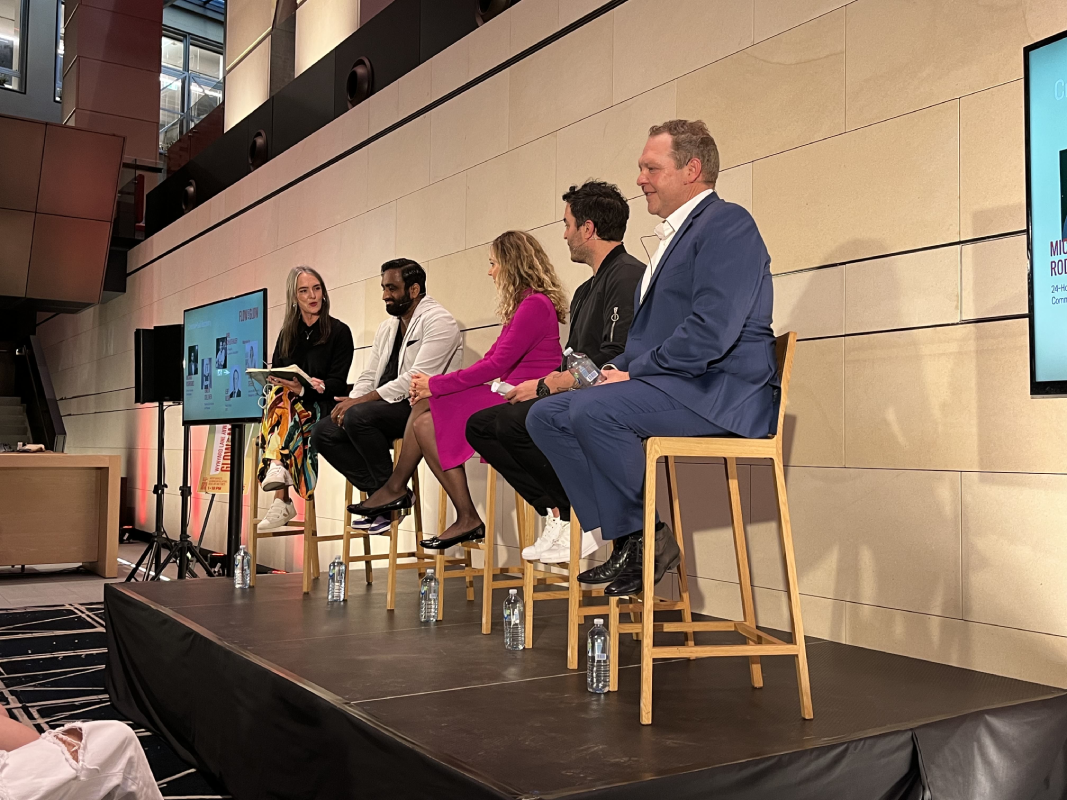Staffing, collaboration and artistic inclusion were on the agenda at a panel hosted by CBRE in Sydney last week.
The panel, which was focused on ‘The Creative-Led Recovery’, formed part of the Flow and Glow festival held in Wynyard last week.
Panellists were drawn from the arts, retail and hospitality industries, featuring: Michael Rodrigues, NSW 24-Hour Economy Commissioner; Karl Schlothauer, Vice President of the Yck Laneways Association; Emilya Colliver, Founder and Director of Art Pharmacy; and Leif Olsen, CBRE’s Head of Retail. The panel was hosted by CBRE’s Executive Managing Director of Property Management in the Pacific, Amanda Steele.
Prior to the panel, The Shout spoke to Michael Rodrigues about revitalising the CBD, and the recovery of hospitality in the city following the lockdown era.
“So firstly, there’s a whole bunch of venues that haven’t opened still, and obviously have been challenged by the pandemic,” Rodrigues says.
“The ones who have opened tended to be pretty well-subscribed, but then there’s a bit of lumpy trading attached in terms of that, as people adjust to the new work cycle.”
As Rodrigues has recognised, the CBD is no longer entirely connected to people’s working habits, and attracting consumers back into the city centre is going to require a ‘holistic’ night-time occasion with hospitality at its heart.
“People want a going-out experience. There are various aspects to it – a transport component, a concert, a play, but almost always, there’s an F&B component to it.”
“So it’s just incredibly important I think. It’s the linchpin [of the night].”
Rodrigues also noted that the return of international conferences had brought new audiences into the city, but that this trend was not without its challenges, with hospitality operators sometimes unaware of when high volumes of customers might arrive. He signposted cooperation between major stakeholders as a key means of meeting this challenge.
“There’s an industry advisory group, and what that recognises is that great outcomes are a function of collaboration between three main stakeholder groups in NSW,” Rodrigues said.
These groups are senior bureaucrats, local councils and industry, who need to act on “information exchange” to meet the new challenges of fluctuating trade, according to Rodrigues.
Now over a year into the job as 24 Hour Economy Commissioner, having been appointed to the newly created role in the most difficult of circumstances, The Shout asked Rodrigues which achievements he was most proud of.
“Getting away that hospitality ’Super Sunday’ in the middle of the Pandemic – coordinating with health [authorities] to escalate hospitality to the status of frontline worker, because we knew the capacity constraints that would occur on finishing restrictions,” Rodrigues says.
“It was no small task, and they put on extra clinics dedicated for hospitality staff.”
Another highlight was managing to relocate Flight Facilities’ Airfields festival from Victoria Park to the Entertainment Quarter within a few days.
“That was a festival that was otherwise going to be cancelled. From the stage Flight Facilities thanked the New South Wales Government for being responsive, and that’s just such a turnaround from where we were a few years ago.”
Despite these achievements, Rodrigues acknowledges that there remains significant challenges for hospitality, with perhaps the most pressing of which being staffing issues.
“The main constraint on the market now, is mainly staff. The demand seems to be there, given the amount of venues that are trading, but hotels and F&B I think have been mainly just constrained by a lack of staff.”
Staffing was also an issue that was raised in the subsequent panel, with Schlothauer saying: “One of the challenges is that most of our staff is casualised, and hospitality is not seen as a permanent career.”
Schlothauer is not only the President of the YCK precinct, but also one of the owners of the ‘House of Pocket’ group of venues – including Pocket Bar and Stitch Bar.
“We’re also looking at how to attract international talent through sponsorship,” Schlothauer says.
“One of the fears of being sponsored is that you’re getting locked up to that employer. We’re looking at a model where YCK would employ staff directly, and then they can hop around between the different bars. So if you’re not getting along with that venue, we can just easily move you over to another venue – so that way we can hopefully attract more people,” Schlothauer explains.
Another topic the panel covered was the integration of art into Sydney’s CBD, with Colliver suggesting that Sydney looks not only to other cities in Australia, but overseas, for inspiration.
“We’ve got a long way to go – but this is where you’re going to see the long term vision of Australia.”
“There’s a centre in Toronto – they’ve got artists onsite and they’re working with First Nation artists, and they’re actually making like all the little buttons and drawers, and all the street furniture,” Colliver said.
Colliver also implored landlords and developers to provide artists with space in the CBD to flourish.
“We just need space. It’s really, really tough, but I think more spaces for artists where they can collaborate and work together – that’s where the innovation starts.”
CBRE’s Olsen highlighted the potential of different business types to collaborate in imaginative ways, using the example of a Rodd and Gunn store in Brisbane which has opened a whisky bar and restaurant on-site.
“They’re looking at different ways to create brand recognition. So you go in there to buy a jacket or a pair of shoes, and you’ll also be able to go in there and have a beautiful meal.”
Here Rodrigues suggested there was the potential to take the concept further, for retailers to collaborate with existing hospitality venues: “The trends are to share the customer.”
To which Olsen concluded: “I don’t think we see it enough, but I think there’s a huge opportunity for like-minded brands that are crossing the boundaries in terms of different types of retail sectors.”

